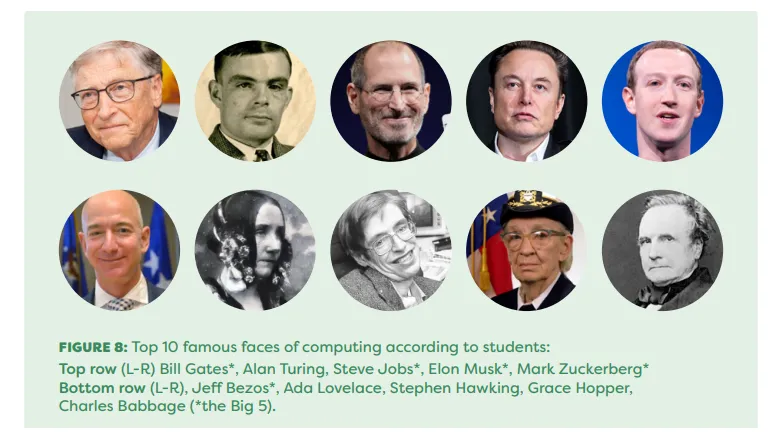It is imperative that we see action to encourage more girls to take computing at school so they can develop the digital skills they will need to be able to participate in and shape our world. The current GCSE is focused on computer science and developing programming skills, and this seems to deter some young people, in particular girls, from taking up the subject. We need to ensure computing is a subject that is appealing to all pupils and meets the needs of young people and society.
Principal investigator Dr Peter Kemp, Senior Lecturer in Computing Education at King’s.
27 June 2024
Stark decline in girls studying computing could harm the UK's ambition to be a tech 'superpower'
The number of girls in England taking a GCSE in computing has more than halved since 2015 which could lead to continued male-dominance of the digital space and harm the UK’s aim to be a technology ‘superpower', researchers warn today

A new report by King’s College London, funded by the Nuffield Foundation, highlights how fewer girls in England are studying computing at secondary school since the curriculum became narrower in scope and the authors call on the incoming government to take action to address the problem.
The report finds girls are more likely than boys to say they do not enjoy computer science GCSE, it does not align with their career plans or it seems more difficult than other subjects. The authors also warn some can be deterred by pervasive stereotypes about the jobs available that use computing or digital skills. When pupils were asked to name famous computing people, men, in particular the tech entrepreneurs such as Bill Gates and Mark Zuckerberg, dominated the top 10 list with only two women included – Grace Hopper and Ada Lovelace – both of whom are long deceased.

To ensure computing is a subject that appeals to more young people the authors make a set of recommendations including the urgent need for curriculum reform, improving support for computing teachers and changing the current narrative around computing to focus beyond male tech entrepreneurs.
They point out that a wider range of digital skills are vital for individuals to participate in modern society and will be needed if the UK is to realise its aim to become a “science and technology superpower.”
The report explores the impact of a 2014 curriculum change in England from Information and Communications Technology (ICT) to a greater focus on Computer Science that elevated computer theory and programming skills.
It highlights how 43% of those who took the GCSE in ICT were girls in 2015 compared to just 21% taking GCSE Computer Science in 2023.
Maggie Philbin, technology broadcaster and Director of TeenTech, an organisation which promotes digital skills, supported the report recommendations saying it is vital all young people have the opportunity to develop digital skills.
At the moment, many students see the subject as ‘difficult’ and vote with their feet if they are aiming for the best grades. It’s time to take a fresh look at the subject and work with teachers to design a curriculum which is more appealing and which teachers feel confident to deliver.
Maggie Philbin, technology broadcaster and Director of TeenTech.
The Subject Choice Attainment and Representation in Computing project (SCARI) report was a three-year study funded by the Nuffield Foundation and co-authored by Dr Peter Kemp, Dr Jessica Hamer and Meggie Copsey-Blake, all of the School of Education, Communication & Society at King’s, and Professor Billy Wong, of the University of Reading.
Through a survey of almost 5,000 students, they found that, among girls who did not opt for computing at GCSE level, 74 percent said they did not enjoy it compared to 53 percent of boys. Also 56 percent of these same girls felt it did not align with their career plans. Among Key Stage 3 pupils, girls were more interested than boys in topics such as digital media, project work and presentation work which were closer to the previous ICT curriculum.
The research also involved interviews with 45 stakeholders including teachers and school leaders and analysing 960 school documents. It revealed many teachers and senior school leaders were dissatisfied with the new GCSE Computer Science specification and felt unprepared to teach it. The teachers called for better access to continuous professional development, especially around ensuring equality, diversity and inclusion, as well as subject-specific training.
Every student should be leaving school with the digital skills required to thrive in the workplace and society. We need to reform the curriculum to include a comprehensive computing GCSE that provides essential skills and knowledge beyond just Computer Science.
Pete Dring, Head of Computing, Fulford School, York.
To encourage more girls to take computing and to give all young people access to better digital skills, the report recommends:
- reforming the computing curriculum with a focus on broader digital skills
- promoting and enhancing teaching training and professional development
- supporting inclusive computing education in schools
- reframing the computing narrative
- showcasing diverse digital opportunities
- increasing access to out of school digital making.
The authors call for a concerted commitment from policymakers, educators, business and other relevant parties. Otherwise, they warn: “The lack of women in computing may lead to heightened vulnerabilities and the dominance of men in shaping the modern world.”
This report demonstrates that changes are needed to ensure that girls have equal access to the digital and technological jobs of the future. Stronger links between employers and educators would help the curriculum keep pace with rapid changes in the labour market.
Dr Emily Tanner, Programme Head at the Nuffield Foundation.
Find out more
Read the full report on The Future of Computing Education.
Find out more about the Subject Choice Attainment and Representation in Computing (SCARI) project.


